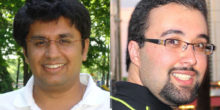Do you need more computing power to move your work forward? Attend the Research Computing Series to learn how you can leverage Syracuse University’s advanced computing resources.
Events
Fall 2019 Research Computing Colloquies
Do you need more computing power to move your research and creativity forward? At the Fall 2019 Computing Colloquies, Daniele Profeta (Assistant Professor of Architecture) and Britton Plourde (Professor of Physics) will discuss how they leverage Syracuse University’s advanced computing resources to strengthen their work.
Spring 2019 Research Computing Colloquies
About the Colloquies
These sessions will explore how computing resources help researchers take on new and greater computational tasks, enhance research productivity, increase the competitiveness of grant submissions, and advance scientific discovery across many disciplines. Continue Reading
About the Colloquies
These sessions will explore how computing resources help researchers take on new and greater computational tasks, enhance research productivity, increase the competitiveness of grant submissions, and advance scientific discovery across many disciplines. Continue Reading
About the Colloquies
These sessions will explore how computing resources help researchers take on new and greater computational tasks, enhance research productivity, increase the competitiveness of grant submissions, and advance scientific discovery across many disciplines. Continue Reading
About the Colloquies
These sessions will explore how computing resources help researchers take on new and greater computational tasks, enhance research productivity, increase the competitiveness of grant submissions, and advance scientific discovery across many disciplines. Continue Reading
About the Colloquies
These sessions will explore how computing resources help researchers take on new and greater computational tasks, enhance research productivity, increase the competitiveness of grant submissions, and advance scientific discovery across many disciplines. Continue Reading
About the Colloquies
These sessions will explore how computing resources help researchers take on new and greater computational tasks, enhance research productivity, increase the competitiveness of grant submissions, and advance scientific discovery across many disciplines. Continue Reading
The Power of Ideas: Spring 2018 Colloquies
Register to hear Assistant Professor Teng Zheng speak on topology design in soft structures by controlling surface wrinkles on April 17 and then on April 25 Professor Timothy Korter speaks on nondestructive and noninvasive identification of historical pigments.
Spring 2017 Research Computing Colloquy Archive

About Research Computing Colloquies
These sessions will explore how computing resources help researchers take on new and greater computational tasks, enhance research productivity, increase the competitiveness of grant submissions, and advance scientific discovery across many disciplines.
Continue ReadingFall 2016 Colloquies
Learn about Improving Scientific Innovation: A Data Science Perspective from Daniel Acuna and then later in the month Shikha Nangia speaks about Breaking Through the Blood-Brain Barrier.
Spring 2016 Colloquies & Deep-Dive Sessions
These series of Computing Colloquies are designed to help campus researchers identify and make the most of the diverse array of campus computing resources available at Syracuse University. All faculty, students, and staff conducting, planning, or supporting research activities at Syracuse University are invited to the sessions. Continue Reading
Gravitational Wave Photo Gallery
Press Conference: Searching for Gravitational Waves. A century after Albert Einstein predicted the existence of gravitational waves, the National Science Foundation will gather scientists from Syracuse University, Caltech, MIT and the LIGO Scientific Collaboration to update the scientific community on efforts to detect them.
Gravitational Wave Announcement
SU’s Crush Powers NSF-funded LIGO Scientific Collaboration. The Laser Interferometer Gravitational Wave Observatory (LIGO) installations in in Hanford Washington and Livingston Louisiana completed their first and long-awaited “observing run”. This 106-day run dubbed “O1” concluded on January 12, 2016 at 8:00 a.m. Pacific standard time. The result? Data. Lots of data.
Fall 2015 Research Community Computing Colloquies
The diverse array of campus computing resources available to SU’s researchers was created to take on new and greater computational tasks, enhance research productivity, increase the competitiveness of grant submissions, and advance scientific discovery across many disciplines. Information Technology Services (ITS), in collaboration with the Research Computing Advisory Council (RCAC), will host a series of Computing Colloquies designed to help campus researchers identify and make the most of these resources. Continue Reading
